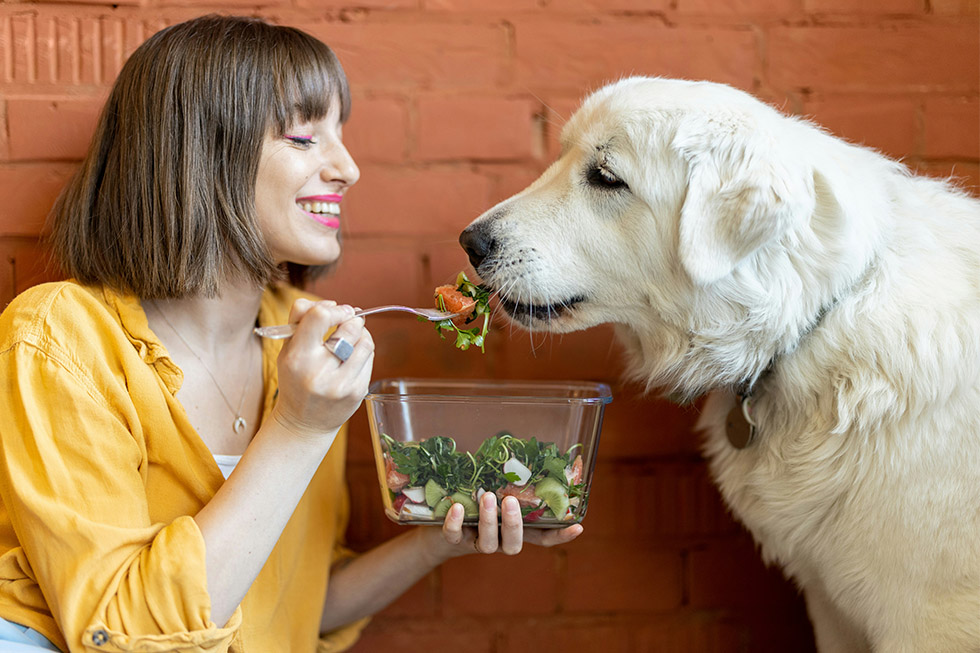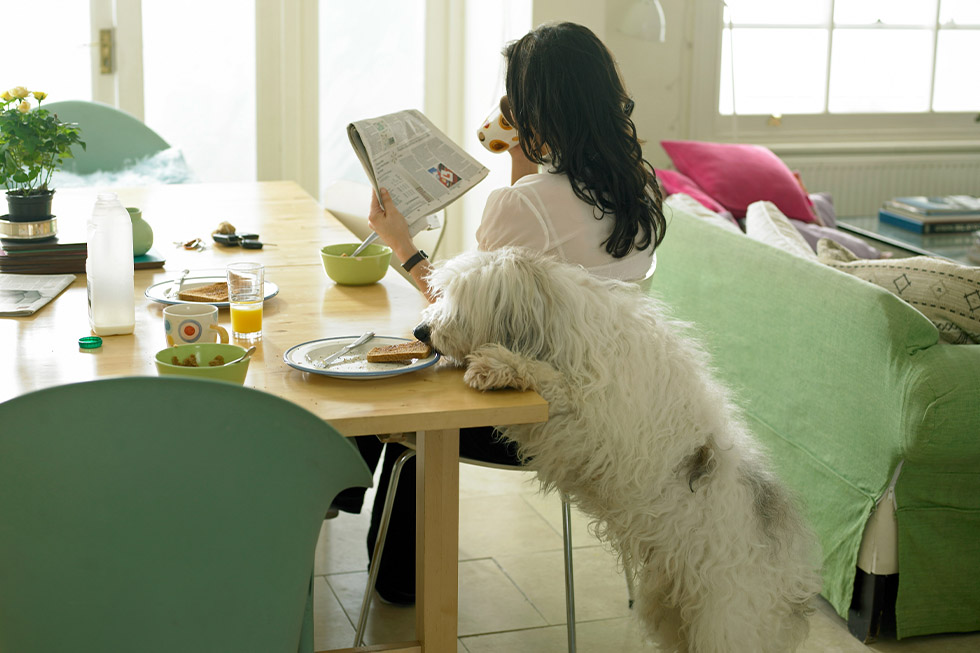
The Dangers of Feeding Pets Human Foods: What Every Pet Owner Needs to Know
When those big eyes stare up at you from under the dinner table, it’s tempting to sneak your furry friend a little treat. However, many human foods can be dangerous — and even deadly — for our beloved pets. Understanding what’s safe (and what’s not) when feeding our pets is crucial to keeping your beloved canine companion or friendly feline healthy.
Pet Insurance Australia dives into the dangers of feeding pets human foods, highlights the top toxic foods for pets, and provides safer alternatives to keep those tails wagging.
Why is Human Food Risky for Pets?
- Different digestive systems: Pets process foods differently than humans. Foods that seem harmless to us two-legged variety can lead to severe health issues for pets, from upset stomachs to organ failure.
- Toxic ingredients: Many common ingredients, like onion, garlic, and chocolate, contain compounds that are toxic to cats and dogs.
- Portion control issues: Even “safe” human foods, if given in excessive amounts, can lead to obesity, pancreatitis, or nutritional imbalances in pets.
Pet obesity is also on the rise, with a significant number of pets in Australia classified as overweight or obese. Extra “harmless” snacks can quickly become a serious health issue. It is important to keep your pets trim and healthy by tracking their treats and ensuring they are removed from their daily diet.
Top Toxic Foods for Pets (Dogs and Cats)
Here’s a list of human foods you should never feed your pet:
- Chocolate: toxic (theobromine and caffeine); causes heart issues, tremors, seizures.
- Grapes & Raisins: can cause sudden kidney failure in dogs.
- Onions, Garlic, and Chives: damage red blood cells; can lead to anaemia.
- Avocado: contains persin; causes vomiting and diarrhoea.
- Macadamia Nuts: cause weakness, vomiting, tremors, hyperthermia.
- Alcohol: even tiny amounts can be fatal; causes vomiting, diarrhoea, coma.
- Xylitol (found in sugar-free gum and sweets): triggers an insulin spike; leads to hypoglycaemia and liver failure.
- Caffeine (coffee, tea, energy drinks): overstimulates the nervous system; can cause vomiting and heart palpitations.
- Raw Dough (yeast): expands in the stomach; risks bloating and rupture.
- Cooked Bones: can splinter; cause choking and internal injuries.
Awareness of “hidden toxins” like xylitol is paramount. Many dog owners like to feed their pets peanut butter; however, this sneaky sugar-free additive can also be found in peanut butter and is highly toxic to dogs. It is important to check labels to ensure you are not accidentally feeding your pet anything toxic.
Watch Out for These Sneaky Dangers
While chocolate, grapes, and onions often get the headlines when it comes to toxic foods for pets, many hidden dangers lurk in everyday kitchens. Ingredients like nutmeg, mouldy foods, cinnamon, and even certain peanut butters (those sweetened with xylitol) can cause serious health problems for dogs.

Other surprising hazards include salt-heavy snacks, yeast dough, cherries, and even blue cheese, which contains harmful mould toxins. Many common human medications, like ibuprofen and paracetamol, are also highly toxic to pets, even in small doses.
The bottom line?
Always check ingredients carefully, store food securely, and stick to veterinarian-approved treats. If your dog ever ingests something questionable, seek veterinary care immediately — quick action can make all the difference.
Healthier Treat Alternatives for Pets
Instead of sharing your plate, here are safe human foods (in moderation) that are better options:
- Carrots (raw or cooked)
- Apples (no seeds)
- Blueberries
- Plain cooked chicken or turkey
- Green beans
- Pumpkin puree (unsweetened)
Always introduce new foods slowly and in small amounts to watch for reactions.
The Science Behind Human Diets vs Pet Diets
1. Stomach Acidity
Dogs have a more acidic gastric environment, which aids in breaking down raw meat and bones. This high acidity plays a vital role by triggering digestive enzymes, eliminating harmful pathogens in raw foods, and softening raw bones to make them easier for the body to break down. On the other hand, humans possess a less acidic stomach, suited for a varied, cooked diet.
2. Digestive Tract Length
Dogs have a shorter gastrointestinal tract, leading to faster digestion. The shorter digestive tract allows food to move through the system more quickly, resulting in faster digestion and nutrient absorption.
3. Enzymatic Activity
Dogs produce fewer salivary enzymes, initiating digestion primarily in the stomach. According to the National Institutes of Health (NIH), dogs produce saliva primarily for lubrication and moistening food, not for extensive digestion. Salivary amylase, the enzyme that breaks down starches, is either absent or present in very low amounts in canine saliva. Humans, however, begin digestion in the mouth with enzyme-rich saliva.
4. Gut Microbiome Composition
While dogs and humans share some common gut bacteria, their microbiomes are quite different. Being natural meat-eaters, dogs have digestive tracts packed with bacteria like Fusobacterium and Clostridium — microbes that thrive on breaking down fats and proteins. Humans, however, have a more diverse gut environment, rich in bacteria like Bacteroides and Bifidobacteria, which help process a wider variety of foods, especially carbohydrates. These differences are a big reason why feeding pets a species-appropriate diet is essential for their long-term health.
These physiological differences underscore the importance of providing species-appropriate diets for pets. Feeding them human foods can lead to digestive issues and nutrient imbalance. Saying no to Rover could save them from an upset stomach or an emergency trip to the vet.
Think Before You Treat
Feeding pets human foods might seem harmless, but it can have serious — even fatal — consequences. When in doubt, always stick to pet-approved treats or consult your veterinarian before introducing anything new into your pet’s diet. Being aware of the dangers that foods can pose, and ensuring you keep your tasty human treats – AKA chocolate – out of reach, can ensure your pet’s safety.
Nadia Crighton is a renowned and accomplished professional in the fields of Journalism, Public Relations, and Writing, with an extensive career spanning over 25 years, 20 of which have been dedicated to promoting the health and well-being of pets.
Get the latest Pet Insider Tips & News
We offer award-winning* pet insurance policies to protect your furry friend’s health and wellbeing. Get a quote today and give your pets the care they deserve.
Archives
Categories
- Cat Care (66)
- Cats (3)
- Dog Care (130)
- Guides (29)
- Health and Nutrition (203)
- Lifestyle and Activities (222)
- Media Release (42)
- Pet Care (256)
- Rescue Dogs (1)


